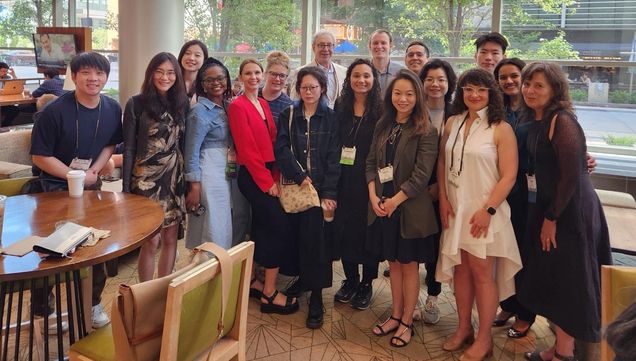Letter From the Director: February 2026
Access, Influence, and Visibility: Communication Research on the Epstein Story
By Michelle Amazeen
On February 4, 2026, BU’s The Daily Free Press published an article with the explosive headline, “BU COM dean corresponded extensively with Jeffrey Epstein in 2014 and 2015, files show.” The story notes that these contacts occurred after Epstein’s 2008 guilty plea for soliciting a minor, a timing the piece treats as central to its significance.
Communication research does not adjudicate conduct but can help contextualize revelations like this by asking: What was the pattern of public attention to Epstein over time, and what communication mechanisms might have shaped that pattern?
Gatekeeping — the selection, shaping, and withholding of information as it moves from sources to audiences — is central to that inquiry. Although his 2008 conviction was public record, it’s important to note that news coverage of Epstein was minimal until 2019 (see Figure 1). MediaCloud, an open-source platform that aggregates and analyzes news content from roughly 70,000 publications, shows a pronounced rise in articles mentioning “Jeffrey Epstein” only in mid-2019.

The paucity of attention to Jeffrey Epstein is further illustrated by Google Trends, an online tool that shows how often people search for specific terms over time, revealing rising topics and relative interest compared to other queries. We can see that public searches about Epstein were virtually non-existent until July 2019 (see Figure 2). Taken together, these tools indicate that widespread public awareness did not track, in the aggregate, with Epstein’s earlier 2008 conviction.

Returning to the notion of gatekeeping can further contextualize the type of news attention that did exist. Coverage prior to 2008 mixed neutral or favorable profiles of Epstein’s philanthropy and social ties with occasional critical reporting that raised questions about the sources of his wealth and the nature of his relationships with powerful people. Sustained, widespread investigative scrutiny was relatively limited until the major reporting from Julie K. Brown of the Miami Herald that preceded his 2019 arrest.
One notable profile was a March 2003, Vanity Fair article by Vicky Ward that scrutinized Epstein’s extravagant lifestyle and probed the sources of his wealth. What was omitted were the sexual assault accusations of two women interviewed by Ward; according to NPR, a live round of ammunition and a dead cat’s head were left outside Vanity Fair publisher Graydon Carter’s home in an apparent attempt to intimidate him into not publishing those allegations. The omission illustrates how editorial decisions — whether driven by legal risk, safety concerns, or other pressures — can suppress salient information and, unintentionally or otherwise, contribute to reputation laundering.
The Vanity Fair example shows how discrete pressures—legal risk, intimidation, editorial judgment—can alter what reaches the public. Frameworks such as Joan Donovan’s Lifecycle of a Media Manipulation Campaign help move us from such anecdotes to systematic analysis of how narratives are created, amplified, suppressed, and, eventually, corrected, and of the actors and tactics that shape what the public hears — and what it does not.
Applying this lens to Epstein’s 2008 case shows multiple constraining forces: a non-prosecution agreement negotiated by prosecutors limited federal exposure and kept key details from victims and the public; most coverage remained local and episodic rather than sustained nationally; and the broader news environment (pre-#MeToo) offered weak incentives for pursuing high-risk sexual-abuse investigations.
Most importantly, what The Daily Free Press article highlights is how Epstein made key adjustments to his media manipulation strategy. Following his 2009 release from prison, Epstein worked to normalize his public profile by cultivating relationships with scientists, journalists, and cultural institutions through philanthropy and access to power networks. That pattern helps explain why individuals and institutions might have engaged with him without encountering the level of sustained scrutiny that emerged only later.
I reached out to Eric Gordon, director of the Center for Media Innovation & Social Impact, who shared the following. “Understanding this nuance does not remove culpability from all those who interacted with Epstein prior to 2019. It challenges the notion that any interaction with the man demonstrates alignment or willing ignorance of his crimes. What is common knowledge now was not then. We need to avoid the intellectual trap of seeing the past through the lens of the present. Instead, as we process the millions of newly released documents from the files, journalists and the concerned public need to evaluate each of the disclosed associations on its own merits, and not as an undifferentiated tranche of ‘gotchas.’”
We must never lose sight of what matters most: Jeffrey Epstein sexually abused underage girls, and survivors deserve justice, support, and institutional accountability. At the same time, communication research helps us identify practical, system-level changes that would make it less likely for similar harms to be obscured in the future. These include stronger disclosure and vetting practices for institutional relationships, clearer newsroom and editorial guidance on handling donations and outside offers of access, and procedures that ensure survivors’ interests are prioritized in institutional decision-making. Such measures are not intended to excuse past behavior but to reinforce accountability and protect students, staff, and the public from future harm — while preserving legitimate academic and editorial exchange.


